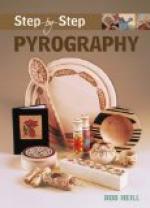When good Saint Hugh of Lincoln
Was a boy in Avalon,
He knew the birds and their houses
And loved them every one,
Merle and mavis and grosbeak,
Gay goshawk, and even the wren,—
When he took Saint Benedict’s service
It wasn’t the least different then!
“They taught me to sing to my Lord,”
quo’ he,
“And to dig for my food i’
the mould
And whithersoever my wits might flee,
To come in out o’ the cold.”
When wise Saint Hugh of Lincoln
Was a bishop wi’ crosier tall,
A wild swan flew from the marshes
Over the cloister wall,
Crooked its neck to be fondled—
Giles, that was vain of his wit,
Said, “Here is a half-made Bishop!”
—But the Saint never smiled a bit!
“My swan will fight for his lord,”
quo’ he,
“And remember what he has heard.
He flies to my gatepost and waits for me—
My friends, make a friend of the bird!”
VIII
THE ROAD OF THE WILD SWAN
“Four larders God gave man,
four shall there ever be—
The mountain, the valley, the marsh, and the sea.”
Roger hummed the old rhyme absent-mindedly and then took to whistling the air, while his small strong fingers pulled and knotted at the hawk’s lure he was making. Just now the training of young falcons was absorbing all of his leisure time. The falconer, Marcel, had showed him how to make the lure, which was shaped something like a pair of wings made of quilted leather and thickly fledged with the wing-feathers of game-birds. When the falconer, who carried it fastened to his wrist by a long cord, gave it a peculiar toss in the air, it looked very like a flying bird. He did this, giving at the same time a certain call, when he wished to bring back the hawk or falcon after flight.
This particular lure was intended for the education of a young merlin of great beauty and promise, destined for Eleanor’s use. The merlin was a type of falcon well adapted to a lady’s purpose, and hawking parties were common among the Norman-English families of the neighborhood—often including dames and demoiselles who flew their own falcons. Roger was rather proud of the fact that Eleanor could ride as well almost as he could, and was quite as fearless. The bright-eyed sleek-plumaged Mabonde had been her pet for weeks, and would already answer her call and eat from her hand. The little round bells of silver, the jesses and hood of Spanish leather, for the falcon’s hunting-gear (Sir Walter’s gift) were laid away in Eleanor’s own coffret. She looked forward happily to riding forth some day with the falcon perched on her small gloved fist, alert for flight.
“Roger,” she said, frowning a little in her puzzle, “that song is true enough, about the mountains and the valleys and the sea—the river, that is,—but what do we get out of the marsh? You can’t even go in there with a boat.”
Roger sloped whistling and gave the matter thought. “We get something out of it when we go hawking,” he decided. “Herons and swans and ducks and wild geese,—widgeon,—all sorts of water-birds nest there. Maybe there used to be other game—when they made the song.”




